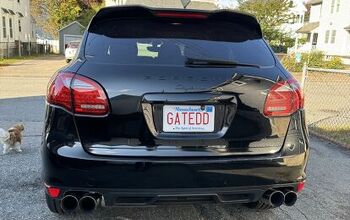The Accidental Motorist: No Fault, No Harm?
Allstate is currently blanketing the videosphere with ads touting “accident forgiveness.” Watching Allstate's viscious vérité, my mind drifted to our prodigal curmudgeon and part-time EMT. I wondered how Stephan Wilkinson would categorize the causation of the twisted metal carnage he's encountered: “accidental,” “avoidable” or just “brain dead stupid?” Allstate's willingness to forgive accidents sounds all warm and fuzzy, but given the potential advantages of apportioning blame, is it really such a good idea?
I remember following a speeding (precapitalization) Mini in my Mazda RX4. No sweat. I knew the route so well I could’ve driven it blindfolded. Which was just as well. The two lane blacktop was shrouded in dense fog. I knew Mini man wasn’t local, and so, heading for trouble. Sure enough, he missed the corner entirely, drove straight into the barrier, bounced across the road and smashed into a wall.
No one was hurt. But if they had been, they wouldn’t have had my sympathy. I’m not an anti-speeding zealot (far from it). I simply believe that anyone who drives "faster than conditions allow” (weather, car, road, traffic, etc.) is responsible for what happens next.
Taking that a step further, if the Mini had bounced across the road into the path of another vehicle, I would hope that the car coming from the opposite direction would be aware that drivers in the fog might cross into his or her lane, especially in a tight turn, and be prepared to take evasive action.
At the other end of the spectrum: Mrs. Wilkinson’s accident. As previously chronicled by SW, she was stationed in her proper lane when her car was rear ended by an inattentive SUV driver. Calling that collision, or the Mini's crash, an “accident” is a complete misnomer. Both events were entirely avoidable.
Which brings us back to Allstate’s forgiveness offer. While the ads show horrific incidents involving entirely blameless drivers, the copy expressly states that policy holders’ rates won’t go up “even if it’s your fault.” In that case, shouldn't we be seeing these accidents from the other driver's perspective: the idiot who caused the collision? He's the guy who really needs Allstate's largesse.
Now I could bang on about the wider cultural issue: society’s move away from any clear notion of personal responsibility, towards the vague idea that we should “forgive” people for the “accidental” consequences of their bone-headed behavior. But I want to stick to the automotive realm.
What would stop Allstate from investigating an accident and determining a suitable penalty— or reward— for their policy holder's driving? In other words, if a collision wasn’t your fault, your rate wouldn't increase. If it was, a rate increase and mandatory (and meaningful) driver’s ed would follow.
Of course, the government’s supposed to be responsible for identifying and punishing bad driving. Clearly, in the majority of cases, this isn’t happening. While accident investigation has become a reputable and reliable science, the instigators of avoidable, non-fatal accidents seldom face investigation, suspension or remedial education.
Even more worrying, police officers are happy to point speed guns at hapless motorists driving well within the realm of safety (no matter what the speed limit sign says), but seem strangely reticent to ticket motorists for sloppy and/or inattentive driving. Time and again, I've seen drivers commit moving violations right in front of a police cruiser without any reaction whatsoever from the officers [who may or may not be] watching.
According to The National Highway Traffic Safety Administration, U.S. traffic deaths reached a 15-year high in 2005: 43,200. Obviously, the stat must be seen in context of the huge increase in total passenger miles traveled. But the fact remains that many of these accidents were caused by motorists who lacked the skills needed to avoid them. Or, to put it more bluntly, crap driving. Someone somewhere should be held accountable.
The driver is, obviously, first. I reckon any state that doesn’t permanently ban a driver convicted of vehicular homicide is criminally negligent for any later injury. Next up: the people responsible for training these lousy drivers. Driver’s ed needs to be state-regulated, with a pass rate no higher than 60%.
Then the licensing authorities must answer for their actions. Then, perhaps, law enforcement should be taken to task (for not catching the killer drivers earlier). Then, maybe, the legal system should face inquiry (how many times have these murderous drivers been “in the system”?).
For their part, the insurance industry has decided to stay above the fray and paint themselves as the safe driver’s friend. And yet they’re more than willing to "forgive" the ones that aren’t safe. In truth, Allstate's no-fault forgiveness policy tells potential customers “Never mind that you drive like an idiot and could kill someone. Let's just call your smash a Mulligan." That’s Allstate’s stand. What’s yours?
More by Robert Farago
Latest Car Reviews
Read moreLatest Product Reviews
Read moreRecent Comments
- Kwik_Shift_Pro4X Where's the mpg?
- Grg These days, it is not only EVs that could be more affordable. All cars are becoming less affordable.When you look at the complexity of ICE cars vs EVs, you cannot help. but wonder if affordability will flip to EVs?
- Varezhka Maybe the volume was not big enough to really matter anyways, but losing a “passenger car” for a mostly “light truck” line-up should help Subaru with their CAFE numbers too.
- Varezhka For this category my car of choice would be the CX-50. But between the two cars listed I’d select the RAV4 over CR-V. I’ve always preferred NA over small turbos and for hybrids THS’ longer history shows in its refinement.
- AZFelix I would suggest a variation on the 'fcuk, marry, kill' game using 'track, buy, lease' with three similar automotive selections.

































Comments
Join the conversation
As a pilot I am amazed at the lack of training, retesting and equipment specificity of driver's licenses. A pilot is limited to low performance planes until they can specifically get an instructor to endorse their license for complex aircraft (over 200 hp, or retractable gear) and can't fly in instrument conditions until trained and licensed. And you need an additional rating for twin engine planes - not even start with what is needed for heavy aircraft, jets or other exotic planes. And every two years a pilot must complete a check ride with an instructor to be sure his skills are polished. Here one can get a license in a 100 hp Hyundia Rio and it's legal for them to them try and control a Ferrari, or Sti or other high performance vehicles. And as the constant crashes show - often the drivers have no clue they are driving WAY over their limits. They also have very limited training in recognizing their own physical and mental limits as well as evaluating driving conditions. And when they mess up - often innocent folks in other vehicles are harmed. It's just criminal that states have such lax licensing rules. European countries have much more difficult tests and their drivers seem to be far better - and it should be much the same here. And don't get me started on distracted drivers. Cell phones, kids in the back and other activities I've seen (reading!!) make for very poor awareness. These folks are who the cops should be catching - but it's easy to prove speed, and hard to prove distraction. Sigh.
About vehicle safety inspections, we have them here in Utah and they're a complete racket. Nothing to do with safety-they should be called "tax inspections" instead. And there's plenty of research by unbiased researchers showing safety inspections are worthless, like the work by Poitras and Sutter on safety inspections. Colorado, with no safety inspections, has a lower accident rate than Utah, which doesn't say much for their effectiveness. They are just a hidden tax, and whats worse, the auto dealers in the legislature have written exemptions into the law for themselves. Check out a website I've put together exposing this racket at safetyinspections.tripod.com/